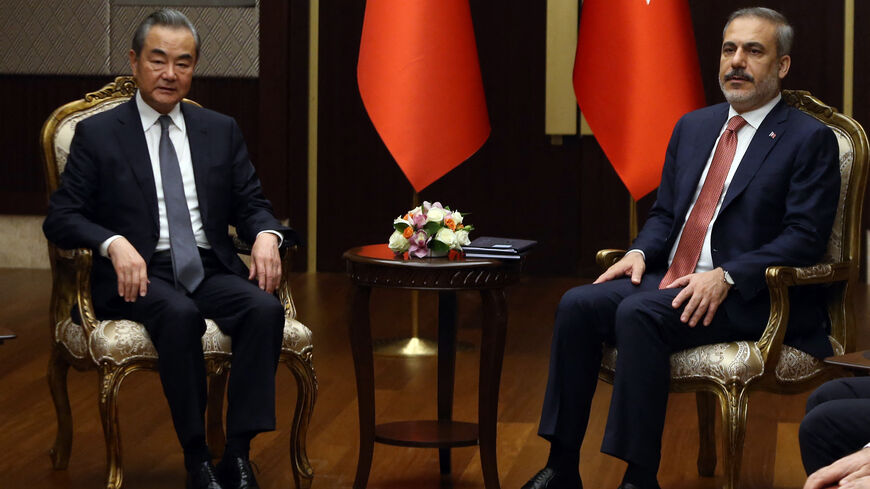ANKARA — Paying the highest-level visit from Beijing to Ankara since 2021, China’s newly appointed Foreign Minister Wang Yi’s meeting with his Turkish counterpart Hakan Fidan and Turkish President Recep Tayyip Erdogan on Wednesday focused on deepening cooperation, particularly on the economy.
According to the Turkish presidency, Erdogan and Wang discussed bilateral relations between the two countries as well as international issues. Erdogan expressed his country’s desire to hold the first meeting of the High Level Working Group, which was set up to align China’s Belt and Road Initiative with Turkey’s Middle Corridor project, which aims to set up a corridor linking the country’s eastern border to the Turkic republics in Central Asia and China through the Caspian basin.
Strengthening economic and commercial ties was also a top agenda item during the meeting between Fidan and Wang, according to Turkey’s public broadcaster TRT.
Citing Turkish diplomatic sources, TRT said the two chief diplomats discussed steps to be taken to increase mutual investments and cooperation in various fields including nuclear energy, agriculture, civil aviation, culture and tourism.
Wang’s Turkey trip marked the first high-level visit from China to a NATO country less than three weeks after NATO accused the Asian powerhouse of “striving to subvert the rules-based international order, including in the space, cyber and maritime domains,” in its final communique after its Vilnius Summit.
Scrambling to draw foreign funds to ease Turkey's foreign currency crunch, Erdogan carefully distanced himself from the tone struck in the joint message.
Speaking at the end of the NATO summit on July 12, Erdogan warned against sidelining Beijing: “At a time when global security risks are increasing, it is only natural to advance the comprehensive cooperation and political dialogue with our partners in the Asia-Pacific region, both at the bilateral level and through NATO. During the meeting, I particularly stressed that these ties need to be strengthened without targeting a third country,” he said in a thinly veiled reference to China.
Despite Ankara’s overtures, however, analysts believe political standings and economic rivalry will likely limit cooperation between the two countries. The thorniest issue in Ankara-Beijing ties stands out as China's treatment of its Turkic Uyghur minority.
After accusing China of perpetuating a “genocide” against Uyghurs in 2009, Erdogan and his government gradually dialed down its criticism of Beijing on the issue to mend fences with the Asian power. Ankara’s restrictions of Uyghur dissidents at home culminated in Erdogan’s state visit to China in 2019. Wang paid a return visit to Turkey in 2021.
Yet, Ankara still has more to do to convince Beijing to compartmentalize ties by keeping the Uyghur issue and bilateral ties as two separate tracks.
Soner Cagaptay, director of the Turkish Research Program at the Washington Institute for Near East Policy, said Turkey’s efforts to mend fences with China over the Uyghur issue haven’t fully restored Beijing’s trust in Ankara.
“Trust is missing in the relationship,” Cagaptay told Al-Monitor. “And what lies at the core of that problem is Turkey's deep and historic ties to the Uyghur diaspora and of course, to Uyghurs in China itself,” Cagaptay told Al-Monitor.
“Turkey became more silent and the Uyghur diaspora also was forced to go quiet. but the Chinese know very well … that Turkey is still the hub of the oldest and largest Uyghur diaspora politically speaking outside of China,” he added.
Meanwhile, Turkey’s efforts to position itself as a production hub for Western companies and its growing ties with the Turkic Central Asian republic stand out as major rivalry areas, according to Nicholas Heras of the New Lines Institute for Strategy and Policy.
“Turkey simultaneously wants Chinese investment to help alleviate its domestic economic challenges, while also positioning Turkey as a key alternate place to China for economic investment for actors such as the US and its European and Asian partners that want to contest China's global power,” Heras told Al-Monitor.
“Turkey also has a natural ‘frenemy’ in China in the broader Turkic world in Central Asia because China is deeply invested in several of those countries, thereby weakening Turkish influence,” he added.








